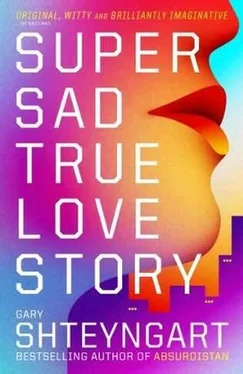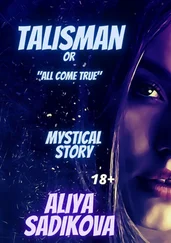“Stop that,” she said. “The zoo is closed.”
I whispered what was required of me. Various pop-psych gems. Encouragements. I assumed the debt and the blame. It wasn’t her fault. Maybe it was my fault. Maybe I was just an extension of her father. The night was dedicated to her sighs and my whispers. We finally fell asleep just as the sun rose over the Vladeck housing projects, an exhausted American flag slapping itself in the summer wind. We awoke at 5 p.m., having nearly missed the car Joshie had sent to help us ascend to the Upper West Side. We dressed in silence, and when I tried to take her hand in the sparkling new Hyundai Town Car, possibly on its maiden voyage, she flinched and looked away. “You look beautiful,” I said. “That dress.”
She said nothing. “Please,” I said. “It’s important for Joshie to meet you. It’s important for me. Just be yourself.”
“What’s that? Dumb. Boring.”
We cut through Central Park. Armed choppers were making their weekend rounds above us, but the traffic below was light and easy, the humid breeze rocking the tops of the immortal trees. I thought of how we had kissed in the Sheep Meadow on the day she moved in with me, how I had held her tiny person to me for a hundred slow beats, and how, for that entire time, I had thought death beside the point.
Joshie’s building was on a street between Amsterdam and Columbus-a twelve-story Upper West Side co-op, unremarkable save for the two National Guardsmen who stood on either side of the entrance, shunting passersby off the sidewalk with their rifles. An ARA sign at the mouth of the street urged us to deny its existence and imply consent. Joshie had told me these men were keeping tabs on him, but even I understood they served as protection. A red dot appeared on my äppärät, along with the words “Wapachung Contingency.” The good guys.
The tiny lobby was filled by an affably heavy Dominican man in a faded gray uniform and the difficult breath coming out of him. “Hello, Mr. Lenny,” he said to me. I used to see him all the time when Joshie and I were more regular friends, when our work was not yet all-consuming and we would think nothing of sharing a bagel in the park or catching some exhausting Iranian flick at Lincoln Center.
“This is where the Jewish intelligentsia used to live, a long, long time ago,” I told Eunice in the elevator. “I think that’s why Joshie likes it here. It’s a kind of nostalgia trip.”
“Who were they?” she said.
“What?”
“Jewish intelligentsia.”
“Oh, just Jews who thought a lot about the world and then wrote books about it. Lionel Trilling and those guys.”
“They started your boss’s immortality business?” Eunice asked.
I could have almost kissed her cold, rouged lips. “In a sense,” I said. “They came from poor, hardy families and they were realistic about dying.”
“See, this is why I didn’t want to come,” Eunice said. “Because I don’t know any of this stuff.”
The old-fashioned elevator doors opened symphonically. By Joshie’s door, a muscular young man in T-shirt and jeans was dragging out a heavy garbage bag with his back to me, the dull interior light of the Upper West Side glistening off his shaved head. A cousin, if I remembered correctly. Jerry or Larry from New Jersey. I stuck out my hand as he began to turn around. “Lenny Abramov,” I said. “I think we met at your dad’s Chanukah party in Mamaroneck.”
“Rhesus Monkey?” the man said. The familiar black pelt of his mustache twitched in greeting. This was no cousin from Matawan. I was looking at dechronification in action. I was looking at Joshie Goldmann himself, his body reverse-engineered into a thick young mass of tendons and forward motion. “Jesus Christ,” I said. “Someone’s been hitting the Indians. No wonder I haven’t seen you at the office all week.”
But the rejuvenated Joshie was no longer noticing me. He was breathing both heavily and evenly. His mouth opened slowly. “Hi-ya,” the mouth said.
“Hi,” Eunice said. “Lenny,” she started to say.
“Lenny,” Joshie echoed, absently. “Sorry. I’m-”
“Eunice.”
“Joshie. Come in. Please.” He examined her as she passed through the door, preyed on the lightly tanned shoulders beneath the black cocktail-dress straps, then looked at me with numb understanding. Youth. A seemingly untrammeled flow of energy. Beauty without nanotechnology. If only he knew how unhappy she was.
We passed into the living room, which I knew to be as humble as the rest of the apartment. Art Deco couches in blue velvet. Posters from his youth-science-fiction films with big-haired women and deep-jawed men-framed conservatively in oak, as if to say they had withstood the test of time and emerged, if not masterpieces, then at least potent artifacts. The names alone. Soylent Green. Logan’s Run . Here were Joshie’s beginnings. A dystopian upper-class childhood in several elite American suburbs. Total immersion in Isaac Asimov’s Science Fiction Magazine . The twelve-year-old’s first cognition of mortality, for the true subject of science fiction is death, not life. It will all end. The totality of it. The self-love. Not wanting to die. Wanting to live, but not sure why. Looking up at the nighttime sky, at the black eternity of outer space, amazed. Hating the parents. Wanting their love. Already an anxious sense of time passing, the staggered bathroom howls of grief for a deceased Pomeranian, young Joshie’s stalwart and only best friend, felled by doggie cancer on a Chevy Chase lawn.
Eunice stood there, in the middle of the living room, blushing intensely, the blood coming in waves. I did something I hadn’t quite expected of myself. I breached decorum, came over and kissed her on the ear. For some reason I wanted Joshie to understand just how much I loved her and how that love was not just predicated on her youth, probably the only thing he appreciated about her. The two people who formed my universe looked away from me, embarrassed. “I’m so glad,” Joshie muttered. “I’m so glad to finally meet you. Jeez. Lenny talks so much about you.”
“Lenny just talks a lot ,” Eunice successfully joked.
I put my hand around her shoulders and felt her breathe. Joshie straightened up and I could see the muscle tone, the deep-veined reality of what he was becoming, the little machines burrowing inside him, clearing up what had gone wrong, rewiring, rededicating, resetting the odometer on every cell, making him shine with a child’s precocious glow. Among the three of us in the room, I was the one who was proactively dying.
“Okay, let’s get some of that yummy good wine,” Joshie said. He laughed with uncharacteristic fakeness, then ran off into the well-stocked galley kitchen.
“I’ve never seen him like this,” I said to Eunice.
“He reminds me of you,” Eunice said. “A big nerd.” I smiled at that, pleased that she could conceive of our commonalities. The idea occurred to me that we could form a family, although I was unsure of what role I would play. Eunice picked a few hairs from my face, her face warm with attention, then glossed my lips with chap. She pulled down on my short-sleeved shirt so that it aligned better with my light cashmere V-neck sweater. “Go like this with your arms,” she said, shaking her own. “Now pull on the sleeves.”
Joshie returned to hand Eunice a glass of wine; I got a mug’s worth of purple aroma. “Hope you don’t mind the mug, Lenny,” he said. “My cleaning woman got stopped at the ARA checkpoint on the WB.”
“The what ?” I said.
“Williamsburg Bridge,” Eunice clarified. Both she and Joshie rolled their eyes and laughed at my slow ways with abbreviations. “You have such a pretty apartment,” Eunice said. “Those posters must be worth a billion. Everything’s so old.”
Читать дальше












